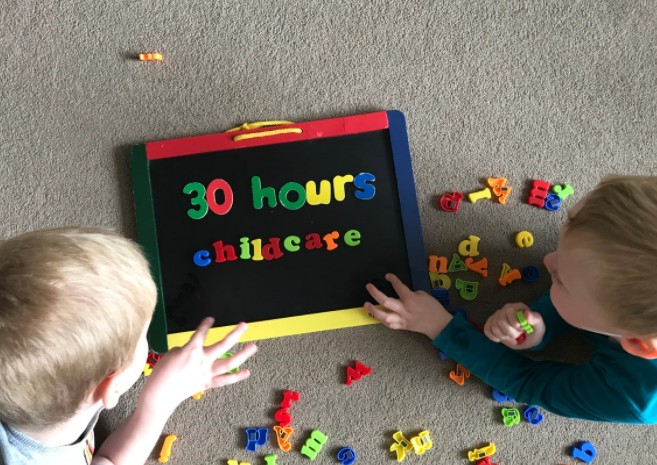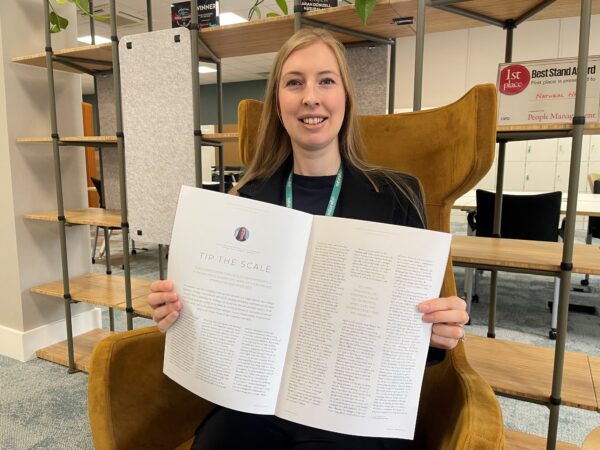The government plans for 30 hours of free childcare per week for working parents have made the headlines over the last week. Nursery free hours extra cash worth ‘less than a stamp’ was reported by the BBC as the National Day Nurseries Association (NDNA) says government funding for providers “falls short of what they need”. The NDNA has already voiced concern about the plans which they’ve said are “in danger as daycare nurseries opt-out” of offering funded places. This was following their annual survey which revealed that only 44% of daycare providers will offer the 30 hours’ free childcare.
The headlines have arrived at the same time that we, as a family, found we would not be able to take up the offer of 30 hours’ free childcare by our current nursery provider as it would cost us more than what we pay now, in short, it’s a false economy.
If you’re reading this and thinking “great, I don’t want to pay for your childcare nor anyone else’s” then you have two choices; either jog on or read on and educate yourself on why we need affordable childcare.
So, what is 30 hours free childcare?
David Cameron announced plans to offer 30 hours a week of free childcare before the 2015 general election; the plans were confirmed by Philip Hammond during the 2017 Budget to with a view to being rolled out in September 2017. To be eligible for the free childcare, parents of 3 and 4 year old’s will need to meet the following criteria:
- Both parents must be working (or the only parent of a lone family must be working).
- They must earn or expect to earn £120 a week for each parent over 25 years old or £112.80 a week for each parent between 21 and 24 years old and £56 a week for apprentices in their first year.
- They must earn less than £100,000.
- They can be in paid employment, self-employed or on a zero hours contract.
More information on eligibility for 30 hours free childcare can be found in Department for Education guidance notes.
The plans to double free childcare from the current 15 hours per week were announced to support working families and women in the workplace. As a working parent, I know that childcare costs (from a combination of nursery fees and wrap-around care at school) are our second largest outgoing after our mortgage payment each month.
In my first HR role, I was earning the national minimum wage which was less than the cost of sending our first son and then 2-year-old to nursery each day. My husband’s income was essentially subsiding me being a working mother, but I knew I needed to do it for the long-term career benefit as this loss would be for a fixed term. Whereas for many mothers (or the lower paid partner) working simply doesn’t make financial sense.
Why 30 hours free childcare is a false economy for our family
At present we benefit from 15 hours of free childcare per week during term time for our 3-year-old currently at a private nursery. We pay a top of £112 per week (a welcome reduction from the amount we were paying prior to our son turning 3 years old), for the 4 days our son attends nursery, which works out at £28 per day, including lunch.
Last week, we received a letter from our son’s nursery explaining that they had struggled to find a financially viable way of offering 30 hours free childcare. Some providers have suggested they may need to start charging for materials which they currently provide free of charge while, in my case, the 30 hours free would only be offered as a session every day from 9 am – 3 pm. For any additional hours required beyond the 9 – 3 session, there will be a daily charge of £28 plus lunch (£2.00 per day). As I work longer hours than the 9 – 3 window, I would need to take the additional hours option which would work out at £30 per day, so £2 more per day than what we currently pay while benefiting from half the amount of free childcare.
At first read, it took us a while to understand what was being proposed – we had assumed we would be able to take the 30 hours how we saw fit so, for example, 3 days of 10 hours per day but this is not an option being offered.
| Our nursery costs: | Per day |
| Under current 15 hours free | £28 |
| Under proposed 30 hours free | £30 |
| An Increase of | 7% |
I’m not going to disclose the nursery provider, as my annoyance is not with them, they have made their position clear and need to ensure sustainability for their business. My annoyance is at the over promise and under deliverance from our government and the £3.77 per hour, Warwickshire County Council provides to the nursery, when their provision costs more per hour to cover. This scheme might work for a parent dropping off at 9 am, starting work locally at 9:30 am and leaving at 2:30 pm to pick up at 3 pm, but it’s not the reality for many working parents. No one is going to take up the offer of the 30 hours free funding which will cost more than the current 15 hours funding if they work full time.
If nurseries do offer the 30 hours free childcare, they are either going to find a way around it to protect their business or risk reducing the quality of care for our children. We need to see the government step up and have thoroughly thought out the costs and implications of such schemes before announcing them half-baked!
Why do we need affordable childcare?
A 2015 report from the Women’s Business Council details the profound impact we could realise in relation to the size of our economy through better utilising female skills. Key findings include:
- Equalising women’s productivity and employment to that of men’s levels has the potential for increasing GDP (gross domestic product) of 35% in the UK – This could be equal to an additional almost £600 billion to our economy.
- Raising the level of women’s employment to the same as men’s could lift GDP by 10% by 2030.
- If earnings for women working full-time (between the ages of 21-60) were equal to those of men, women would earn an extra £190,551. This represents £1,592 billion in potential earnings lost for the economy, or £40.8 billion each year.
Further information can be found in the full report: Maximising women’s contribution to future economic growth.
We need to support women who choose to return to the workplace after having a child so that they can continue with their careers and go on to achieve career progression. There’s little point pushing for more women in the boardroom if we aren’t utilising their talent nor maintaining their employment. If high childcare costs are a barrier for women in the workplace, then it needs to be addressed, not only to ensure quality and diversity but to benefit our economy as a whole.
I don’t require further funds to keep me in the workplace as I’m determined to continue growing our business and we are fortunate to be able to cover the costs we currently pay. But the initiative is designed to encourage more working families, specifically women into work, so I don’t see how a mother perhaps on maternity leave, seeing the false economy I have demonstrated, is going to feel supported in maintaining their employment. The only way we can do this is for the government to fully commit to their initiative and provide further funding to nursery providers so that they:
a) offer the scheme in the first place;
b) don’t then have a need to look for ways around it, and;
c) the government could offer a better incentive for women currently out of the workplace compared to families like mine, which could come by way of means testing the initiative too.
Image: our boys helped to create the featured image for this blog post over the weekend before we practised some spellings together.






As a childminder with 8 years’ experience and rated Outstanding, if I was to have only one child in my care benefiting from the ‘free’ 30 hours of childcare (making no other changes to how I charge for my services), I would see my income fall by around £2100 a year. It would mean a pay cut of 17%. So I will not be offering the scheme, and the risk is that I will have to close down eventually as parents will choose larger nurseries who can find ways around the system. That’s what it means to me – losing a job that I am good at, losing my business. Or carry on doing it and working below the minimum wage.
Thank you for sharing your story, it’s really interesting to hear your viewpoint as a childminder. I hope you are able to continue selling services on the value you can provide from your experience and home from home setting!